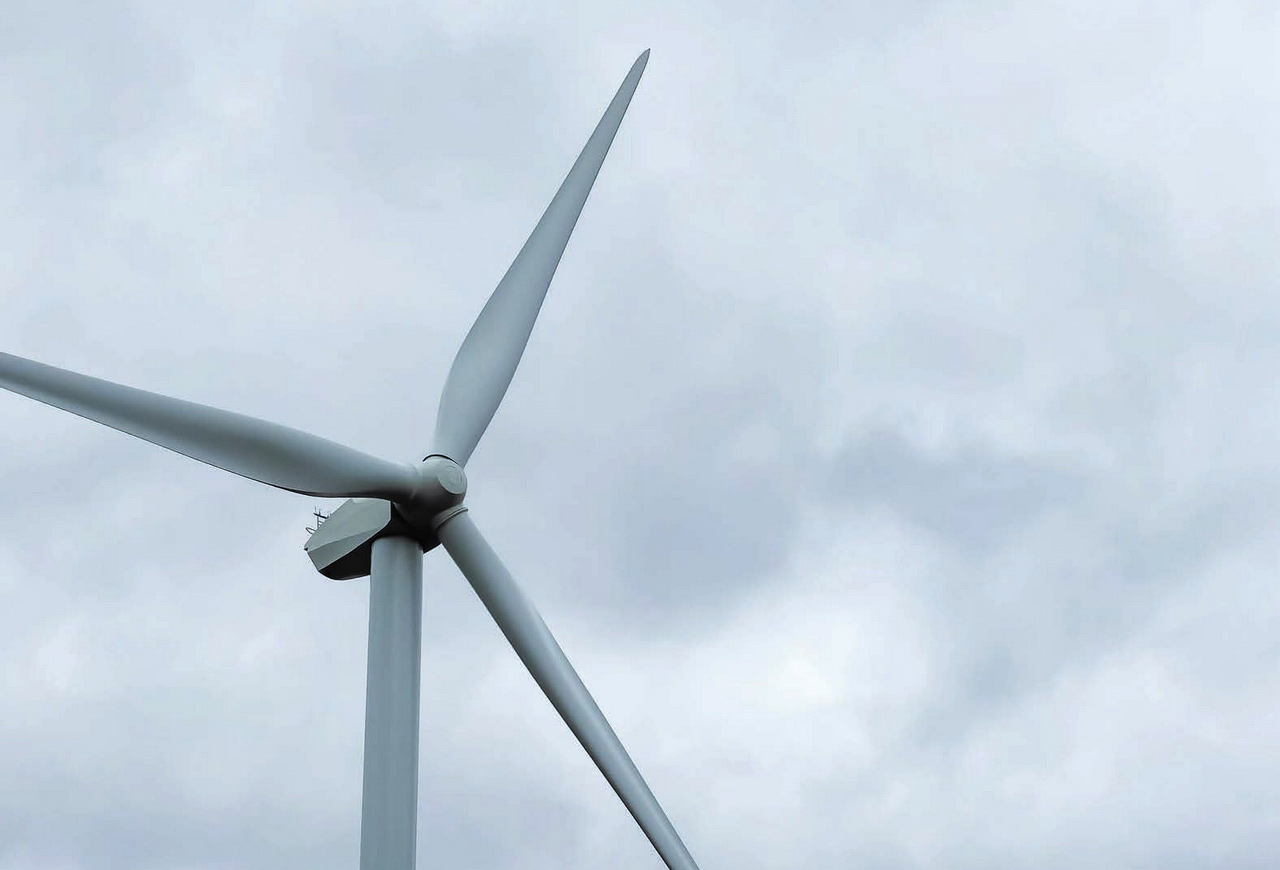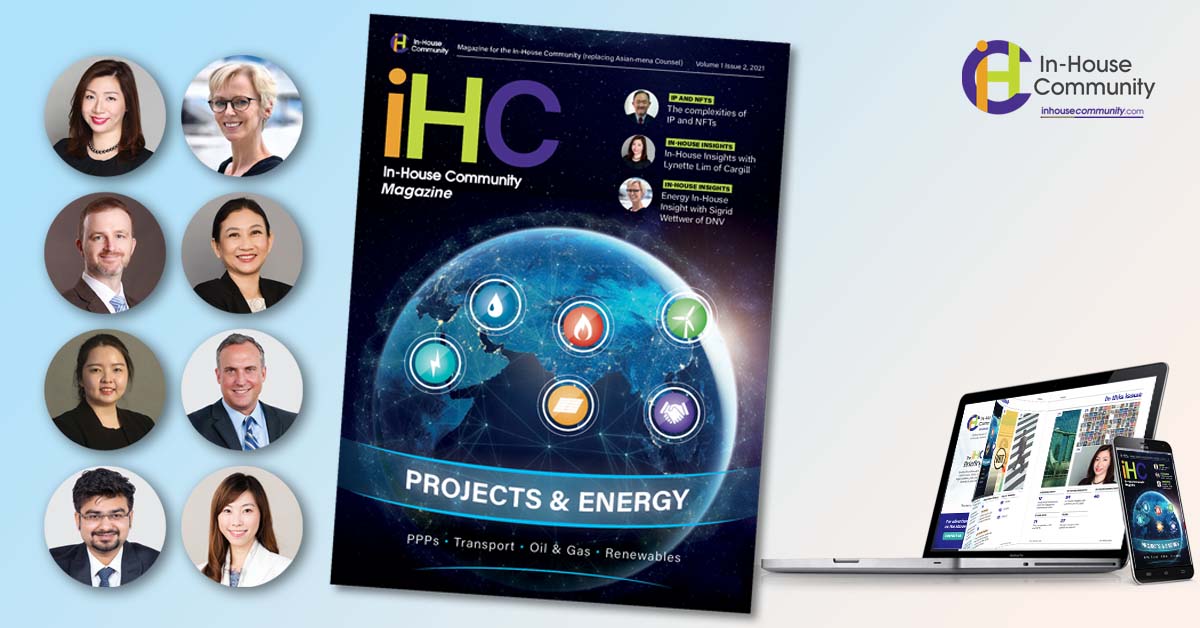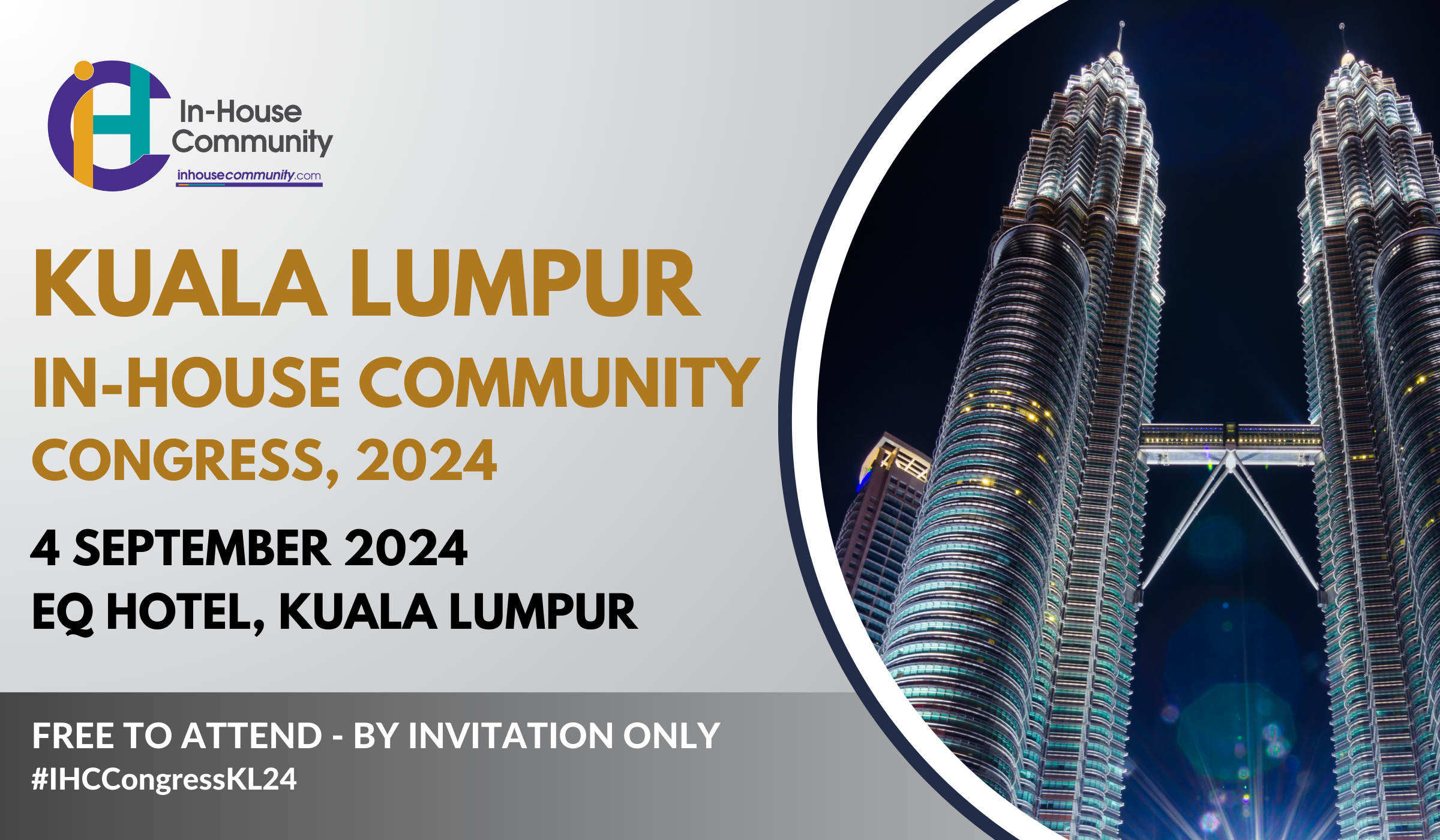Q. Give Us An Overview Of Your Role As In-House Counsel In The Energy Sector, In Particular. What Sort Of Work Are You And Your Team Often Called Upon To Help Solve?
DNV is a leading global independent expert in risk management and quality assurance. We provide services to various fields including energy and maritime. Our regional legal teams support DNV’s business areas in the Middle East and Asia Pacific with day-to-day issues, but also strategic and regulatory matters. The team includes five lawyers with diverse legal and cultural backgrounds working from Shanghai, Singapore, and Dubai. We support DNV’s operations during the contracting phase to guard against legal uncertainties during or after service delivery and on regulatory matters. For DNV’s Energy Systems, our lawyers work closely with the energy contracting section, which is a global team of highly skilled contract advisors.
Q. What Are Some Key Trends You Are Keeping An Eye On In The Overall Energy Sector?
The larger trend for the energy sector and wider society is the shift towards more sustainable energy solutions and decarbonization. Much of the energy industry changed significantly in 2020. DNV’s Energy Transition Outlook (ETO) 2020, where we present an independent, model based forecast of the world’s most likely energy future through to 2050, found that energy-related CO2 emissions peaked, brought forward five years by the Covid-19 pandemic. We are now seeing lower demand and lower prices for fossil fuels and many governments are pushing plans to stimulate their economies using policies and investments designed to “green” their energy systems.
Similarly, our ETO data also found that Covid-19 reduced global energy demand by 8% in 2020 and although it will pick up again this year, it will be from a lower base. Pandemic-linked behavioral shifts such as remote working and less commuting will have a lasting effect on energy use.
This energy transition has been discussed for many decades, but we are now seeing large players such as pensions fund and oil and gas companies joining the trend. The ticket sizes of investments in wind, solar, storage and energy efficiency are getting larger. Many green technologies are proven and tenders across the globe have dropped prices in certain markets. Businesses and society are also getting more involved in discussing how to tackle climate change. With the awareness of the need to “build back better” after Covid-19, electric vehicles and better energy efficiency have gained a lot of public attention.
Q. Over The Last Decade, Which Regulations Or Legislation “Changed The Game” For The Energy Sector?
In my view, it is difficult to identify the one game changing legislation as there are many different regulatory approaches and developments. But I would point to the 2015 Paris Climate Agreement as setting the pace for many national and regional initiatives. With sufficient scale of less carbon-intensive fuels and technologies, we may still be able to reach these goals.
However, the market alone will not transform the harder-to-abate sectors. Stronger policies and regulations are needed. In many areas – for instance, the heating of buildings, high-heat industrial processes and heavy transport – the decarbonization process has fallen short of the Paris Agreement. Technical solutions to decarbonize these sectors exist (such as hydrogen), but implementation has been patchy at best. For hard-to-abate sectors, near-term policy mechanisms in the form of R&D funding, economic incentives for piloting and implementation or performance standards and mandates are urgently needed to and bring solutions to commercial readiness. Nationally Determined Contributions should significantly strengthen these areas. Energy efficiency can greatly reduce energy demand in most sectors, but split incentives and lack of regulations prevents progress which, from a societal perspective, can come at low or even negative costs.
In my view, it is difficult to identify the one game changing legislation as there are many different regulatory approaches and developments. But I would point to the 2015 Paris Climate Agreement as setting the pace for many national and regional initiatives.
Q. Can You Discuss How You Think About The “Hydrogen Economy”? I.e., Is It Considered A Threat Or An Opportunity? Does It Pose New Legal Problems, Or Fewer? Is It A Fantasy Or An Expectation?
Hydrogen is not a new technology. It has existed for decades with many attempts to make it price competitive. Given that hydrogen is the simplest element and emits only water when consumed for energy production, I believe it is a major opportunity. Its weakness is that its production using an electrical current requires costly electrolysis equipment and generates substantial energy losses. The main alternative production (steam methane reforming) relies on hydrocarbons and currently is cheaper due to low fossil-fuel prices. Therefore, carbon pricing is highly significant for hydrogen to take up. The main effect can be observed in the manufacturing and transport sectors, where policies are tied to carbon prices. Consequently, for higher carbon prices, the assumption is that there is also a stronger decarbonization push
favoring hydrogen.
What is needed are policies to encourage the uptake of electric vehicles and fuel-cell EVs in heavy transport, such as e- buses and fuel-cell trucks. Also, we should ramp up support for R&D on sustainable and carbon-neutral fuels for maritime and aviation as well as policies and funding to boost commercial-scale production.
Another challenge is safety and liability risks. In most countries, policies and regulations are not yet prepared for a shift towards hydrogen, which is hampering investments in this field.
Q. Are Any Regulations Holding Back More Green Energy Initiatives? And What Sort Of Regulations Would You Suggest Are Removed To Help Boost These Initiatives?
Some regulators still give impetus through public funding to fossil-based technologies. For example, government subsidies for production and consumption, export credit guarantees like in Japan and South Korea, and coal power plant sales from China. These slow down the transition towards renewable technologies. What is needed are policies to encourage the uptake of electric vehicles and fuel-cell EVs in heavy transport, such as e- buses and fuel-cell trucks. Also, we should ramp up support for R&D on sustainable and carbon-neutral fuels for maritime and aviation as well as policies and funding to boost commercial-scale production.
Q. How Does The General Regulatory Environment In The Asia-Pacific Differ From Perhaps The Us Or Europe, In Terms Of The Energy Sector?
Europe is a frontrunner in the energy transition. The EU steers energy policy to align with the Paris Agreement and integrate economic, industrial and environmental policies. The Green Deal targets a sustainable EU economy and faster decarbonization. Southeast Asia’s economic weight is growing along with its carbon footprint, despite it being amongst regions most vulnerable to climate change. Here, reliance on hydrocarbons in the energy mix is high, mostly oil for transport, and coal and gas for electricity. Unfortunately, this comes with a high degree of regulatory uncertainty dampening private-sector investment in renewables including fast-growing economies like Vietnam or Thailand. In Asia, governments and companies are motivated to implement initiatives, but the most important element is investment security in the long term, thus regulations must be stable. Once there is a sudden regulatory change, investors get insecure, include a risk premium or withdraw from planned projects. Local protectionism, for example in the form of market access restrictions for foreign investors, often hinders the transition towards greener energy.
Q. Do You See The Asia-Pacific As “Catching Up” To US/EU Energy Regulations, Or Is The Region On A Different Trajectory?
Barriers to investment in renewables in Southeast Asia include regulatory uncertainty, fiscal support for and vested interests in hydrocarbons, as well as bank-dominated funding categorizing large-scale renewable projects as “risky.” Climate-motivated shifts in foreign direct investment could be a game-changer to overcome these obstacles. With the latter, we see a shift in the right direction like in Indonesia, which is currently easing requirements for foreign investments.
Cross-border bilateral power integration is taking place already. In the future, multilateral trade and interconnection will spur deployment of variable renewables. The Laos-Thailand-Malaysia-Singapore Power Integration Project is a good example. Electricity market restructuring is unfolding in Malaysia, Philippines and Vietnam as they transition from vertically integrated market structures to competition and customer choice. This will encourage new and more efficient power generation. However, these changes are considered rather late if you compare them with the energy transition in Europe.
Q. Can You Give Us Some Behind-The-Scenes Insight Into How In-House Legal Teams Juggle The Business Needs Of An Energy Company With The Social Pressure Of Sustainability? I.e. Activist, Shareholder Or Public Pressure That Threaten To Tie Up A Company’s Operations.
Driven by our purpose to safeguard life, property and the environment, we empower our customers and their stakeholders with facts and reliable insights so they can make critical decisions with confidence.
Strong value-adding customer relationships are essential to our success and our vision is to be a trusted voice to tackle global transformations. We deliver services that truly meet our customers’ needs, helping them to solve problems, make the most of their opportunities and, ultimately, enhance their own business success. In today’s environment, transforming a company to operate less carbon intensive creates a competitive advantage. DNV strongly believes that we can help accelerate the transition to greener energy alongside with our customers.
Q. How Do Ideals Like The “Net Zero” Or The Underdogs Affect Your Legal Work On A Day-To-Day Basis?
Environment and sustainability targets are embedded in our DNA and are reflected in both DNV’s deliverables and the way we work. DNV is committed to the shift not only by its purpose, values and strategy, but also our actions. Let me mention two recent examples:
Earlier this year, we combined our Oil & Gas and Power & Renewables businesses to become Energy Systems. This better reflects the emerging energy future as renewables take a greater share of the energy mix and decarbonization will be a major focus. By combining our expertise, we will better serve customers operating in, and entering, the energy market.
As a second example, the Norwegian Foundation Det Norske Veritas – which owns DNV Group – has teamed up with the Maritime and Port Authority of Singapore and five other industry leaders to establish a maritime decarbonization center in Singapore in April 2021.The center’s stated mission is to catalyze and facilitate decarbonization in the maritime sector and will be supported by contributions from the founding members totaling S$120 million. Its creation follows the release of a recommendation by the International Advisory Panel – a Singapore Maritime Foundation initiative – on maritime decarbonization.
At DNV Group Legal, we are supporting projects like these, which I personally find very rewarding.
Q. How Has The Pandemic Changed The Way Your Team Works?
For many of us, the past 15 months were extraordinarily challenging. We all worked from home for a significant amount of time, which posed a variety of personal and professional challenges. The wellbeing of colleagues is more at risk in an environment that makes it difficult to draw clear lines between work and private life. In addition, without meeting in person it is more difficult to observe concerning developments in this regard, so maintaining the virtual dialogue with colleagues is vital. On the positive end, the pandemic boosted the transition to flexible ways of working, which presumably will continue post-pandemic. Hopefully, this will make it easier to balance an ambitious career with a rewarding private life for knowledge workers.
Our Group Legal Regional Team managed to recruit a new colleague in a fully remote manner, which required extra effort and good communication from all involved. In the end, the process worked out very well. This is only one example showing that a lot is possible if there is buy-in to change from all stakeholders.
If you require advice on any of the issues raised in this briefing, please contact the authors below.
 Sigrid Wettwer Sigrid Wettwer
Sigrid Wettwer is a dually qualified lawyer, being a member of the German Bar and also admitted to the roll of solicitors of England and Wales. Since 2018, she has held the position Head of Group Legal Middle East and Asia Pacific at DNV, a leading global independent expert in risk management and quality assurance headquartered in Norway. She leads a diverse team of highly dedicated lawyers working from Dubai, Shanghai and Singapore. Before moving to Singapore for this role, Sigrid was working for DNV in Hamburg and Shanghai, having different functions within the company’s legal department. |
*This article is the IHC Magazine’s off-shore update for April 2021 issue. Click here to read the full magazine

















